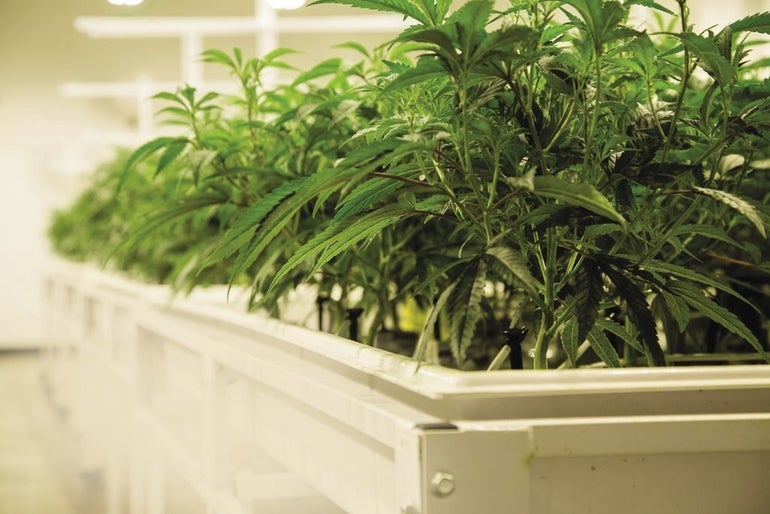Allowing adults to purchase and use marijuana at some retail facilities — think cannabis clubs — could reduce the risk of children getting a hold of the drug and may limit how much legal marijuana is illegally transported out of state by visitors, a Cannabis Advisory Board subcommittee recommended Tuesday.
“The package store model is old fashioned and the consumer really wants an outlet, a place to consume cannabis and do it safely,” Michael Latulippe, an official with the Massachusetts Patient Advocacy Alliance and a member of the Cannabis Advisory Board, said.
Latulippe presented the CAB’s Cannabis Industry Subcommittee’s recommendations for social consumption, which the Cannabis Control Commission is expected to incorporate into its draft regulations for the legal marijuana industry. He said he pulled from existing regulations governing the alcohol and tobacco industries as he developed his recommendations.
The basic idea of onsite social consumption is to allow adults to purchase a marijuana product and use it in the same location, much like purchasing alcohol at a bar or a cigar at a cigar bar. Allowing onsite consumption would provide legal locations for tourists staying in hotels and renters who are prohibited from smoking in their apartments to consume marijuana. They could also give parents a place to smoke or consume marijuana without ever bringing it around their children, officials also said.
“By having these onsite facilities, we could potentially alleviate the need for some parents to go home with the cannabis themselves, allow them to consume it on site,” Latulippe said Tuesday. “It also alleviates the issue of interstate trafficking with tourists and people who are going to be coming to the state. Requiring them to buy large quantities of cannabis could cause for some problems.”
Among the subcommittee’s recommendations is that the CCC should develop state limits on the “serving size” for social consumption, establish a maximum number of servings allowed per “immediate use package” that cities and towns could adjust, and set a maximum daily exposure limit at which point a budtender could decide to stop serving a consumer.
Latulippe said the subcommittee agreed that the CCC should set a threshold to become a licensed onsite consumption location, suggesting that any facility at which marijuana sales account for at least 51 percent of overall sales should be eligible to apply for such a license. The CCC should make exceptions for hotels, restaurants and other businesses to accommodate creativity in the marijuana industry.
“We could develop tiered licensing, in a sense similar to how alcohol is managed in terms of wine and beer, and hard liquors already for bar establishments. Basically, this tiered licensing type would include inhalation, ingestion and dermal application as well as one retailer license that would encompass all types of marijuana consumption,” he said. “There are so many businesses possible in terms of consumption of marijuana. We don’t want to limit it to just inhalation. There’s a lot of, for instance, massage therapy places that want to incorporate dermal application of marijuana products.”
The subcommittee also recommended that the CCC develop strong air quality, odor control and air filtration requirements for designated smoking areas at onsite consumption facilities, adopt regulations to protect employees from second-hand smoke, and prohibit employees who could be exposed to second-hand smoke from operating machinery or kitchen equipment.
The advisory board subcommittee additionally suggested that the CCC use the Department of Public Health’s regulations around medical marijuana packaging as a starting point for packaging rules, impose no limit on the size of craft cannabis co-operatives, and impose DPH’s medical marijuana product testing requirements to retail adult use marijuana.
The Market Participation Subcommittee presented recommendations, including that the CCC should “consider and weave” its statutory requirement to “promote and encourage full participation” among communities disproportionately impacted by “marijuana prohibition and enforcement” into every aspect of its licensing and employment processes.
The CAB’s Public Health and Public Safety subcommittees were expected to discuss their recommendations with the CCC on Tuesday afternoon. The CCC is expected to incorporate those suggestions into draft regulations that will be debated over five days next week.
The CCC has scheduled public meetings for policy discussion and debate on the draft regulations each day next week and plans to file its draft regulations with the secretary of state by Dec. 29.
CCC Chairman Steven Hoffman said Tuesday that by Wednesday he will compile a list of the issues addressed by the subcommittee recommendations and then will assign each commissioner to lead the discussion of at least one issue next week during public debate on the regulations.
“I actually think the week of December 11 is going to be a very seminal week in terms of our commission and the industry we’re trying to build,” Hoffman said late last month. “We’re going to get it right, but there are some very, very complicated and, as I said, potentially controversial topics that we need to discuss and we’re going to do it in public because that’s the right way to do it.”

